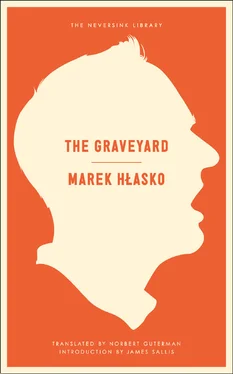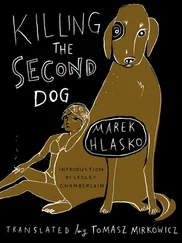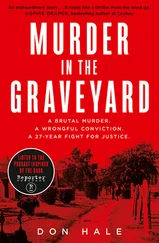Franciszek was silent for a minute, then bent beside the little boy. He rummaged in his pockets, trying to find something to give him, but he found only his comb, mirror, and papers. He said: “You’ll have to wait for Mama.”
The boy twisted his mouth angrily. “I do, do I?” he said, jumping up like a monkey and rattling his chain. “Unchain me, Uncle. I’ve been here long enough. Or else, tell me a story. Do you know stories?”
“What story shall I tell you?” Franciszek pondered. The two boys at the end of the corridor started a fight, rolling furiously on the floor and getting entangled in their chains.
The boy said to Franciszek, “Tell me what you see down there.” He pointed to the hole, and Franciszek leaned over, staring into the darkness till his eyes smarted. There was nothing unusual in the street; in fact there was scarcely anything to be seen. A drunk went by, then two drunks, then three drunks, one of them holding his hat in his hand; then a mother with a child, and an old man pushing a cart loaded with coal; there were drunken footsteps and sounds of laughter answered by cries of rage; and all that attracted the eye was the glow of the neon sign, which seemed to outlast the light of the stars.
“What do you see, Uncle?” the boy repeated, tugging Franciszek’s trousers.
“The city,” Franciszek said. “The city. Brightly lighted white houses, people coming home from work, laughing; now I see some boys running after a ball; and there’s a little girl who just stumbled over her jump rope. Neon signs. And lights, lights, lights …” He stopped, and then asked the boy: “Where does the artist live here?”
“The one that makes statues of the little grandfather?”
“The little grandfather?”
“The little grandfather with the mustache. Is that the one you mean?”
“Yes.”
“The door at the end,” the boy said. And when Franciszek walked off, he cried after him, “Uncle, come and see me again.”
“I’ll come,” Franciszek said. As he looked at the faintly gleaming bell, he thought: “Another door. What have I come for? What do I expect? You, behind this door, you can’t be different. And that’s what I have come for. I didn’t leave my room: I’ll just be looking into a mirror. I’ll open the door to myself. Shall I turn back?” But he knocked. A man in a dressing gown examined him carefully before showing him in. They crossed a dark entrance hall, and suddenly Franciszek found himself within a circle of light — a bright, incredibly glaring light, which the other used in his workshop. He closed his eyes and mechanically sat down on the chair that had been pushed over to him. Only after a long while did he reopen his eyes, slowly, with an effort, like a man preparing to feel pain.
“Coffee?” asked the painter.
“No, thanks.”
“Tea?”
He shook his head. “Don’t put yourself out—” he began, but the painter interrupted him.
“Stop,” he said, raising his hand imperiously. “Every word delays our joy. These are mere formalities: I have no tea or coffee anyway. We’ll drink vodka.”
He left him in the painful glare, and after a while came back with a bottle and two glasses, which he put on the rough, paint-spattered table. He filled the glasses, humming a tune.
“To your health,” he said, raising his glass.
“Your health,” Franciszek said after him.
They drank. The painter refilled their glasses.
“To the underground,” Franciszek said, raising his glass. But the painter put his down. “Why the underground?” he asked. “What underground? Why the underground, rather, for instance, than the eternal beauty of pretty girls?”
“To the underground,” Franciszek repeated. “We were both in the underground.”
“When?”
“I don’t know when,” he said closing his eyes; the weird glare was splitting his head. “Can glare have a color?” he thought. “It can. White. This is a white glare.” He said, “During the war.”
“Right,” the painter said, staring at the bottom of his glass. “Absolutely right. We are heroes, aren’t we? I forgot. I beg your pardon. Your health.”
They clinked glasses.
“And yours.”
They lighted cigarettes; they looked at each other, incredulous, finding nothing, striking no spark; outside, the city whirred insistently, cats screamed in the corridor; boys’ voices chanted monotonously, “Unchain me, Uncle; unchain me, Auntie …” Suddenly their eyes met; and both smiled with relief.
“Now I remember,” the painter said. “You’re Skinny, aren’t you?”
“Yes,” Franciszek said, “and you’re Historian.”
“They’ve certainly made a mess of us,” the painter said, smiling happily. “It’s just plain shit, isn’t it?”
“Shit,” Franciszek said. “What have I come here for, for God’s sake? I wanted only one thing — I wanted you to be different from me, to think differently, speak differently, I don’t know; maybe I wanted to say something, and I wanted you to answer by spitting in my face …” Turning his empty glass in his hands, he said: “It might be a good thing to agree once and for all that the whole thing is senseless. In fact I can go now.”
“Have you joined the secret police yet?”
“No. And you?”
“I haven’t either.”
“So I can go now.”
“As a matter of fact you can,” the painter said. “You can go and you can give up the idea of going anywhere else, no matter where. You won’t hear anything different. But you can try to fool yourself. You may succeed. That’s what everyone else is doing.”
Franciszek looked about the studio and suddenly realized why there was such a glare. Everywhere busts of the Great Teacher were piled up; the snow-white plaster sharply reflected the light of the bulbs; identical mustachioed faces stared with dead eyes from every wall.
“Christ,” Franciszek stammered. “Why have you got so many of them?”
“Commissions,” the painter said. “Easy, clean work: plaster, water, a mold. They sell like hot cakes. I have a customer who runs a clandestine shooting gallery on the outskirts. We Poles always like to protest …” He hummed a tune, then said, sighing: “At first I modeled only the Prime Minister and St. Francis of Assisi. Easy work; they’re both bald. But no one can compete with him .” He picked up a cast. “Socialism’s pin-up Number One. Want one for a souvenir?”
Franciszek did not answer. He sat motionless, his head between his fists. From every corner of the studio a dead face stared at him. Someone walked by in the corridor, accompanied by an imploring chorus of “Unchain me, Auntie.”
“Do they always cry like that?”
“No,” said the painter. “Only up to a certain age. Then they can move about safely.”
“We called you Historian,” said Franciszek. “I remember that after the war you were going to paint everything we experienced — the woods, the fights, man triumphing over fear, and fear triumphing over man. Life and death. Even then you were making sketches.”
“I don’t give a damn about what happened then,” the painter said. “I threw out my sketches. I don’t want to talk about it. Everything’s all right the way it is. So far as I’m concerned, it can go on like this forever. I understand too much to be interested in anything.”
“It’s funny,” Franciszek said. “Man always dreamed of one thing — knowledge. That was the meaning of his eternal struggle. He dreamed of only one thing — to understand his times, his purpose, his place, his meaning, and his moment in eternity. And now that he has come closest to this understanding, knowledge is his main enemy. It’s better not to understand — knowledge is a disease.”
Читать дальше






![Ричард Деминг - Whistle Past the Graveyard [= Give the Girl a Gun]](/books/412176/richard-deming-whistle-past-the-graveyard-give-t-thumb.webp)


